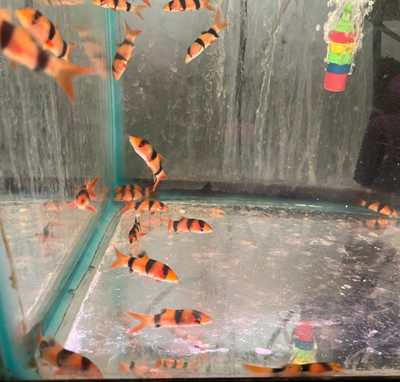Clown Loaches
Posted by Max Gandara on on 30th Apr 2025
Clown Loaches: The Colorful Companions for Your Aquarium
The Clown Loach (Chromobotia macracanthus) is a vibrant and entertaining freshwater fish, often sought after by aquarium enthusiasts for its striking appearance and lively behavior. Originating from the rivers of Indonesia, particularly Borneo and Sumatra, Clown Loaches add a splash of color and activity to any aquarium. In this blog, we’ll explore everything you need to know about these fascinating fish, from their care requirements to their social behavior.
Appearance and Characteristics
Clown Loaches are easily recognizable by their distinctive orange bodies with bold black bands. These bands often form a unique pattern for each individual, making them even more interesting to observe. With the potential to grow up to 12 inches in captivity, they require ample space and proper care to thrive. Their barbels, or whisker-like appendages, help them forage for food, adding to their charm.
Tank Setup and Environment
Creating a suitable environment for Clown Loaches is essential for their well-being. Here are some important considerations:
-
Tank Size: A minimum of 75 gallons is recommended for a small group of Clown Loaches, as they are social creatures that thrive in groups of at least five.
-
Water Conditions: Maintain a temperature between 77°F and 86°F with a pH level of 6.0 to 7.5. Consistent water quality is crucial, so regular water changes and a good filtration system are necessary.
-
Substrate and Décor: Use fine gravel or sand as substrate to protect their sensitive barbels. Include plenty of hiding spots with rocks, driftwood, and plants to mimic their natural habitat and provide a sense of security.
Diet and Feeding
Clown Loaches are omnivorous and have a hearty appetite. A varied diet will keep them healthy and vibrant:
-
Staple Foods: Offer high-quality flake or pellet food as a base.
-
Protein Sources: Supplement with live or frozen foods like bloodworms, brine shrimp, and daphnia.
-
Vegetable Matter: Include blanched vegetables such as zucchini, cucumber, and spinach to ensure a balanced diet.
Behavior and Social Structure
Clown Loaches are known for their playful and social nature. They exhibit interesting behaviors that can be a joy to watch:
-
Schooling Fish: They are happiest in groups and will often display schooling behavior, which is both entertaining and indicative of their social needs.
-
Nocturnal Activity: While active during the day, Clown Loaches tend to be more lively at night, so providing a dimly lit tank can encourage natural behaviors.
-
Communication: They are capable of producing clicking sounds, especially during feeding or social interactions, adding an auditory element to their presence.
Common Health Issues
Like any pet, Clown Loaches can face health challenges. Being aware of common issues can help in early detection and treatment:
-
Ich (White Spot Disease): Clown Loaches are particularly susceptible to ich. Regularly monitor them for white spots and treat promptly with appropriate medication.
-
Stress: Ensure they are kept in a stable environment with compatible tank mates to reduce stress levels.
Conclusion
Clown Loaches are a delightful addition to any large aquarium, offering vibrant colors and engaging behaviors. By understanding their needs and providing a suitable environment, you can enjoy their company for many years. Whether you're a seasoned aquarist or a newbie, these charming fish can bring joy and fascination to your aquatic world.

